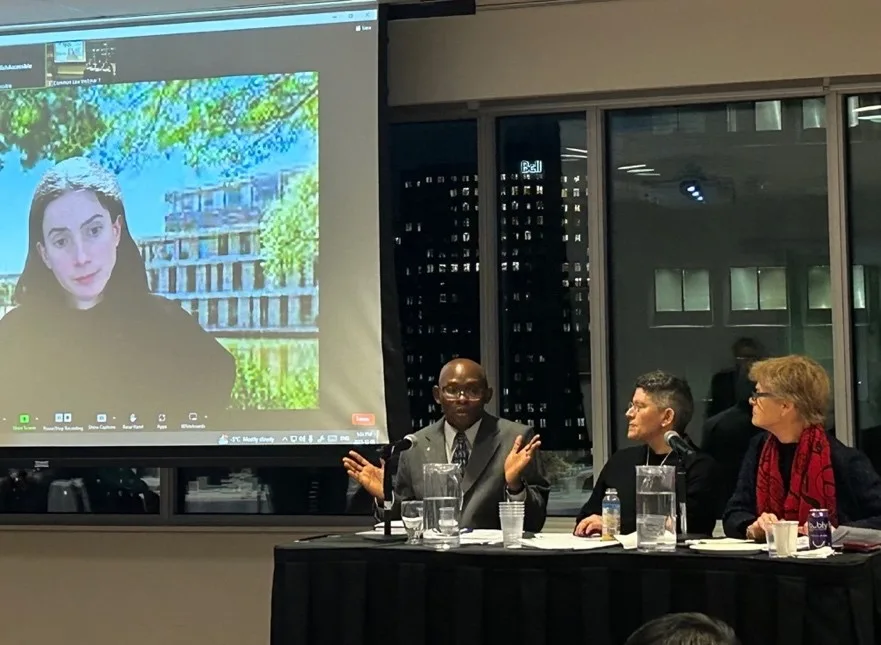By Bertina Lou
On December 8, 2023, the 75th anniversary of the Universal Declaration of Human Rights (UDHR) was commemorated at the Advancing Health Justice in a Turbulent World Symposium at the University of Ottawa. Hosted by the uOttawa Centre for Health Law, Policy and Ethics, the International Commission of Jurists, the Human Rights Research and Education Centre, the Global Health Law Consortium and the American Society of International Law, this event featured experts from institutions worldwide to facilitate reflections and discussion on a revitalized approach to tackling interconnected global health challenges through rights-based approaches.
As the COVID-19 pandemic pushed the human rights implications of public health crises to the forefront of international law, the World Health Organization (WHO) worked to conclude negotiations towards a Pandemic Agreement, an international instrument on pandemic prevention, preparedness, and response. Participants at the symposium examined the Pandemic Agreement’s shortcomings in relation to a rights-based approach to health and considered how human rights frameworks can drive future reforms to pandemic-related international law.
Open AIR co-founders Jeremy De Beer and Chidi Oguamanam presented during the event at the “Strengthening Pandemic Preparedness and Response Through Global Health Law Reforms” panel and the “Health and Human Rights in the Next 75: Forward-Looking Reflections on the Future of Health Rights” panel, respectively.
Strengthening Pandemic Preparedness and Response Through Global Health Law Reforms

Left to right: Jason Nickerson, Katrina Plamondon, Jeremy De Beer
Jeremy De Beer examined highlights of the most recent October 2023 draft of the Pandemic Agreement, with a particular focus on the preamble and Articles 9 to 12.
The Pandemic Agreement’s preamble recognizes that intellectual property (IP) rights should not prevent Member States from taking measures to protect public health though it acknowledges the effects of IP issues on pharmaceutical prices. De Beer offered a critical eye to the preamble’s position on the importance of rapidly sharing samples and genetic sequencing data of pathogens in future pandemics, recognizing the negative consequences that may arise if access and benefit sharing is not equitably addressed. For example, when the government of South Africa shared the genomic sequence data of the Omicron variant during the COVID-19 pandemic, the country was met with travel bans. As such, Article 9 on “Research and development” and Article 12 on “Access and benefit-sharing” of the Pandemic Agreement must be designed well if related provisions are calling also for open science approaches.
Other perceived shortcomings of the Pandemic Agreement include weak phrasing. Article 10 on “Sustainable production,” for example, uses discretionary and vague terms such as “encourage” (but not “require”) in relation to building manufacturing capacity.
Furthermore, Article 11 on “Transfer of technology and know-how” calls for parties to commit to agree upon time-bound IP waivers to accelerate the manufacture of pandemic-related products but the COVID-19 pandemic has demonstrated this process often takes too long to be useful. Committing to agree is a far cry from either commitment or agreement.
Article 11 does contain a promising clause, nonetheless, hinting that patent holders that have received public financing for pandemic-related products may be expected to waive the payment of royalties by manufacturers in developing countries during pandemics. Yet again, however, the provision lacks teeth.
These are amongst the challenging issues now being negotiated at the meetings of the International Negotiating Body in Geneva, Switzerland.
Health and Human Rights in the Next 75: Forward-Looking Reflections on the Future of Health Rights

Left to right: Judith Bueno de Mesquita (on-screen), Chidi Oguamanam, Lisa Forman, and Barbara Grantham
Chidi Oguamanam situated the advancement of global health justice alongside the evolution of human rights, especially those of marginalized groups. Despite global recognition of Article 25(1) of the Universal Declaration of Human Rights (UDHR) and Article 12 of the International Covenant on Economic, Social and Cultural Rights, both of which describe physical and mental health as fundamental rights, there remain differences in formal and substantive equality for marginalized populations that hinder access to health justice.
Indigenous Peoples in particular experience disparities in nearly all social determinants of health, with few significant improvements 75 years after the UDHR. Given that health disparities are rights violations in essence, it is imperative to change the narrative.
For consideration as part of the development of a global health framework based on human rights, Oguamanam raised the following three concerns:
- National accountability so that domestic policy entails reporting mechanisms, permits court litigation and advocacy, and rethinks data and research ethics.
- New technologies and data to account for how generative artificial intelligence, the environment, food agriculture, and the life sciences intersect with the social determinants of health in order for technology to be recognized as a ground of discrimination for human rights claims.
- A deliberate approach to knowledge governance that supportsIndigenous epistemologies in their cultural context of knowledge production, traditional medicine and health practices.
The international health order, as it exists, does not protect the most vulnerable populations. A solution worth exploring is the implementation of one cohesive global strategy with a “no boundaries” approach. Moving forward, the Pandemic Agreement (and any strategy based on a human rights approach to health)should address these considerations.
Key Takeaways from the Symposium
The symposium highlighted linkages between global health and human rights law, leaving participants with several important ideas and calls to action:
- Internalize hyper-disciplinarity in your work. Moving from interdisciplinarity to hyper-disciplinarity should be the aspirational status quo while tackling the interconnected, “wicked” global health problems of our time.
- Global health governance is important. The lateral movement of ideas across the global health landscape is necessary for ideas to become norms and, ultimately, applied practices in civil society.
- Continue the conversations on advancing health justice through rights-based approaches in your communities of practice.
The UDHR recognizes that the inherent dignity and the equal and inalienable rights of all members of the human family is the foundation of freedom, justice and peace in the world. May the next 75 years bring everyone closer to a more equitable and just reality.
View select session recordings on the University of Ottawa’s Faculty of Law, Common Law Section YouTube Channel under the “Conference” playlist.










